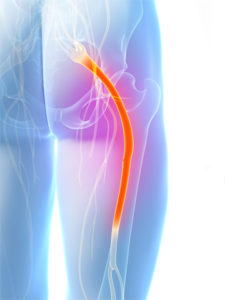
In many cases, MRI findings may include herniated discs that promote patients to seek a surgical solution to their pain. Unfortunately for many, such a surgical solution provides only a minimum of relief with many patients continuing to have
pain for years after the surgery. *1
What is often unrealized is that there may be a simple mechanical cause to your sciatic pain. *2
Even though we appear to be symmetrical, most people function with commonly found asymmetries that actually help us perform many tasks more effectively. For instance, it is normal for us to stand on our right leg more frequently than our left regardless of being right-handed or left-handed. However, these asymmetries can be magnified over time because of repetitive use and result in painful conditions such as sciatica.
Thankfully, IFAST Physical Therapy specializes in such cases of mechanically driven pain syndromes like sciatica, lower back pain, and hip impingements. Our system of evaluation determines the source of your mechanical pain and allows us to provide a movement-based solution to resolve your pain quickly. In many cases, patients experience reduced pain on their first visit.
Even if you’ve tried physical therapy to resolve your sciatica before and before you agree to a surgical procedure that may not provide the relief you seek, schedule your free injury consultation with IFAST Physical Therapy. Surgery is not the only option.
Call us at 317-578-0998 or email us at [email protected]
*1. Machado, G.C., Witzleb, A.J., Fritsch, C., Maher, C.G., Ferreira, P.H. and Ferreira, M.L. (2016), Patients with sciatica still experience pain and disability 5 years after surgery: A systematic review with meta-analysis of cohort studies. European Journal of Pain. doi: 10.1002/ejp.893
*2. M. Torriani, S.C.L. Souto, B.J. Thomas. Ischiofemoral impingement syndrome: an entity with hip pain and abnormalities of the quadratus femoris muscle. Am J Roentgenol, 193 (2009), pp. 186–190
0 Comments
Join the conversation